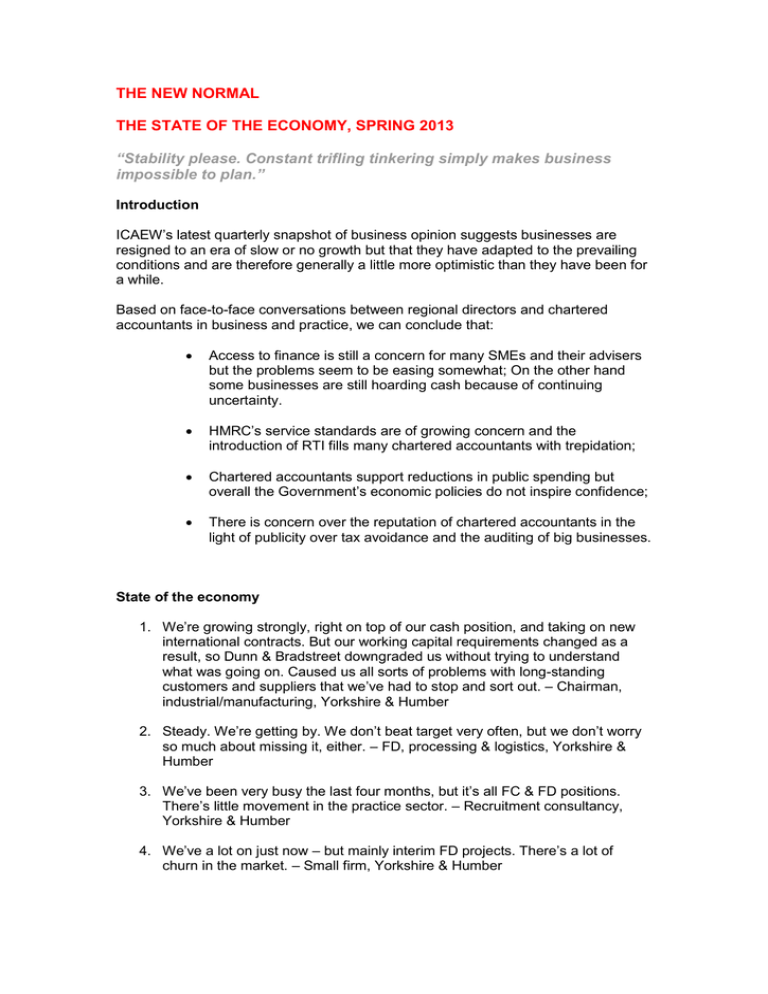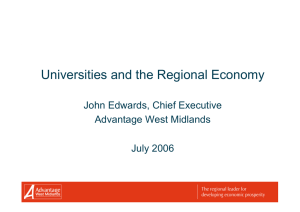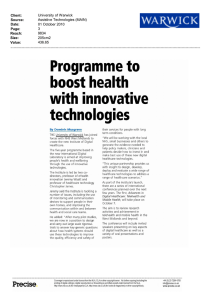THE NEW NORMAL THE STATE OF THE ECONOMY, SPRING 2013
advertisement

THE NEW NORMAL THE STATE OF THE ECONOMY, SPRING 2013 “Stability please. Constant trifling tinkering simply makes business impossible to plan.” Introduction ICAEW’s latest quarterly snapshot of business opinion suggests businesses are resigned to an era of slow or no growth but that they have adapted to the prevailing conditions and are therefore generally a little more optimistic than they have been for a while. Based on face-to-face conversations between regional directors and chartered accountants in business and practice, we can conclude that: Access to finance is still a concern for many SMEs and their advisers but the problems seem to be easing somewhat; On the other hand some businesses are still hoarding cash because of continuing uncertainty. HMRC’s service standards are of growing concern and the introduction of RTI fills many chartered accountants with trepidation; Chartered accountants support reductions in public spending but overall the Government’s economic policies do not inspire confidence; There is concern over the reputation of chartered accountants in the light of publicity over tax avoidance and the auditing of big businesses. State of the economy 1. We’re growing strongly, right on top of our cash position, and taking on new international contracts. But our working capital requirements changed as a result, so Dunn & Bradstreet downgraded us without trying to understand what was going on. Caused us all sorts of problems with long-standing customers and suppliers that we’ve had to stop and sort out. – Chairman, industrial/manufacturing, Yorkshire & Humber 2. Steady. We’re getting by. We don’t beat target very often, but we don’t worry so much about missing it, either. – FD, processing & logistics, Yorkshire & Humber 3. We’ve been very busy the last four months, but it’s all FC & FD positions. There’s little movement in the practice sector. – Recruitment consultancy, Yorkshire & Humber 4. We’ve a lot on just now – but mainly interim FD projects. There’s a lot of churn in the market. – Small firm, Yorkshire & Humber 5. I am pretty confident about the outlook for us in 2013, but there is no doubt that the continuing eurozone crisis will affect our businesses. Regional and national markets offer the best opportunities for us at the moment, but I am a little concerned that public sector cuts will continue to impact us. – FD, SME business, North West 6. I welcome the enterprise zones, but I am uncertain about the impact of local enterprise partnerships. I certainly haven’t seen any positive impact to date. – CFO, manufacturer, North West 7. I am realistic rather than positive for 2013, but encouraged that the deficit is being addressed. Will it be a fantastic year? No, it won't but I think if we get to grips with some of the issues in economy we'll stay stable rather than see any further decline. – Chairman, manufacturer & distributor, North West 8. I am fairly optimistic about the next 12 months. It's taken a lot of hard work to grow our business over the last couple of years but we've created jobs and we believe we can increase turnover and it could be possible to export. – FD, SME business, North West 9. There has been a lot of noise around the UK's loss of the AAA credit rating and the weak GDP data but the North West's vibrant entrepreneurial spirit is one of many reasons to be cheerful. We have a large number of quality, dynamic SMEs in the region and I am positive for the outlook for business the North West. – Partner, Big Four Firm, North West 10. Trading conditions in 2012 continued to be very challenging, but our group has continued to respond to market conditions and we have reduced our fleet and streamlined our operating costs. We are now in a good place to respond when the construction industry improves. Fingers Crossed. – Group FD, Plant Hire Business, North West 11. I share concerns over the future prospects for the economy but Germany is going into recession. Instead of being the laggard in Europe, maybe we will be the leader. – FD, Midlands 12. The North-South divide is getting worse. There is a lot more money being invested in London and the South East. – FD, Midlands 13. At one stage the engineers in Birmingham would deliver when they felt like it and if it wasn’t right you could always send it back. All those engineers have gone and the ones that are left are super-efficient. They are very impressive in the way they manage their production and that’s a significant change. – FD, Midlands 14. One of the downsides is the ability to get cheap labour from Poland. It’s cheaper and flexible. You can lay them off, as happened to us a couple of years ago. We are now back to the same levels and use that labour again but it was absolutely vital we were able to cut that cost in the intervening six months. – FD, Midlands 15. The one thing we need for manufacturing is stability – even knocking along the bottom is stability of a sort and investment decisions can be made. – Small firm, Midlands 16. There’s a new normal. Companies feel they need to hold onto cash to cope if there’s another 2008. It’s not just about confidence; it’s about more prudent management. – Large firm, Midlands 17. The Government mortgage guarantee seems to be working and all the housebuilders are making profits. It’s the civil engineering sector that’s in trouble. – Large firm, Midlands 18. I think Keynesian economics will win the day in this country again but not quite yet. – Small firm, Midlands 19. Clients remain ultra-cautious, holding on to cash. – Medium-sized firm, Wales 20. The construction sector remains very poor, as do retail, clubs and pubs. – Medium-sized firm, Wales 21. Stability is needed – with no bad news for a sustained period (eg on Europe, other business issues). Businesses with some overseas activity are holding up well. – Medium-sized firm, Wales 22. Farming clients are making acceptable livings; the general feeling is that clients who have held on so far will be able to continue. – Small firm, Wales 23. I am pessimistic about the outlook. Clients are ceasing business rather than selling, very few start-ups, B2B doing less well than a year ago. – Small firm, Wales 24. The firm has had an encouraging start with a good level of enquiries, although there has been limited substantive result so far. – Medium-sized firm, Wales 25. We’re busy with nine ventures going through under 18-30 start up loan scheme from a tattoo shop to a café. It’s good to see something coming through for the young. – Small practitioner, East of England 26. We’ve picked up three new clients and have had two inquiries through BAS. – Small practitioner, East of England 27. There’s more start-up activity. We’ve also seen consolidation amongst solicitors. – Practitioner, East of England 28. There’s a trend amongst charities to get rid of the CEO to cut costs which is wrong because the gap has to be filled by the trustees. It may be a way of saving money but trustees are not there to deal with management. – Practitioner, East of England 29. The bad weather in January affected sales – people don’t want to go to shops or tea rooms. Sales to supermarkets have been OK but sales direct to the customer have been down. – Jam-maker, East of England 30. We’re having a better first quarter. People are investing in IT and beginning to do capital projects. Cloud computing is on the up. – IT company, East of England 31. Whilst the market is challenging we’ve had steady growth and London is a good place to do business. We’re taking on more staff. – Security and logistics company, East of England 32. Getting work is not an issue at present but attracting appropriately trained staff is. This is making it difficult for us to fulfil contracts or achieve our target margins. – FD, South West 33. It is taking much longer to get payments, particularly where American firms are concerned. There is a big end-of-month bubble where people have been paid and get jobs done then. – FDs in various sectors, South West 34. Though confidence is improving, the barrier to investment is still low confidence. People don’t want to invest so they hang on to their cash. – Small firm, London 35. The biggest problem I see is getting customers to pay. I have one or two clients who could well go bust for the sake of the 20 per cent (of their invoice value) the bank isn’t advancing them. – Small firm, London Economic policy 36. I do not think George Osborne is doing a good job. It’s all for the big guys and he’s not supporting our size of client at all. They survive despite him. – Independent practice, Yorkshire & Humber 37. George Osborne is trying to do a gentle U-turn without threatening his reputation for austerity. – Small firm, Midlands 38. I have got three clients who all wanted to invest in machinery and are now spending, putting in orders – one for £250,000 – thanks to the change in capital allowances. – Small firm, Midlands 39. As a manufacturing business that does capital equipment I welcome allowances going up for our own investment and people buying our machinery. – FD, Midlands 40. The Chancellor isn’t wrestling with the fiscal issues. Tough decisions have to be made about the cost base. The future is going to be blighted until we start getting our costs down. – FD, Midlands 41. Last year there was a hoo-ha when the Chancellor capped housing benefit at £500 a week but a lot of landlords have reduced their rates which shows we need to challenge some of these costs in the future. – Small firm, Midlands 42. If the Government wants a diversionary tactic, it shouldn’t be on gay marriage it should be supporting half a dozen regional initiatives to see what works well and get something moving. I am into higgledy-piggledy growth. – FD, Midlands 43. My clients are mainly in the Third Sector and they are still seeing the effect of Government spending cuts. A lot of front-line services are being suspended, deferred or deleted. That’s not the case for the high-paid staff and quangocrats. – Small firm, Midlands 44. The Government should spend money on road repairs and employ unemployed people to carry out the work. Some smaller roads haven’t been repaired since 1945. – Small firm, Midlands 45. The Government talks of business banks and getting lending going again and investment in shovel-ready schemes and all the rest of it but nothing ever happens. It’s like wading through treacle. – FD, Midlands 46. Pound for pound, invention in ensuring existing companies survive and grow is more cost effective for employment than funding start-ups. Clearly however we need start-ups in order to feed through to the list of existing companies, but probably not so many as thought provided that the inventions are made at the right times. – Small firm, London 47. If there is one thing we could ask from the Government, it is stability please. Constant trifling tinkering simply makes business impossible to plan. – Business adviser, London Tax and audit 48. On the Big 4 firms issue, this has been of concern in big transactions for big corporates for some time – too many conflicts – getting better as next few firms by size grow, but lack of competition is not healthy. – Group FD, Specialist Manufacturing Business, North West 49. More people are coming to the UK as a result of the tax regime. – Practitioner, East of England. 50. I am not sure where this almighty storm about the tax affairs of Google, Amazon and Starbucks will end up but I do think it is quite dangerous. – Big 4 firm, Midlands 51. Margaret Hodge!!!!!!!!!!!!! – FDs, attending an event in South West Banks and finance 52. Businesses are still paying down debt, but the bank-related horror stories are receding. – Manufacturing FD / Civic office holder, Yorkshire & Humber 53. Access to finance is still a key issue. Most of our clients don’t even bother talking to their bank now – they tell us it is a waste of their time and energy. – Partner, Small Firm, North West 54. I am very positive about the economy: banks are beginning to get to grips with the zombie companies we all talk about. – Large firm, Midlands 55. There is no shortage of money at the moment, there is a shortage of demand. I think there are people with good ideas but it’s confidence that’s lacking. – FD, Midlands 56. If you have got a great new idea nobody is going to lend you the money because of the lack of security. – Large firm, Midlands 57. The banks don’t want to be bothered with tiny little businesses. – Small firm, Midlands 58. A big piece of the Government bank needs to follow the 3i route to risk money for SMEs. – Large firm, Midlands 59. There are new providers of more traditional funding. – Business Adviser, East of England 60. Factoring and invoice discounting have been more active, which I believe to be a prelude to the end of the recession. – Medium-sized firm, Wales 61. Businesses in Wales are highly dependent on the activities of Finance Wales (broadly, a Welsh Government bank with some European funding, backed by Barclays); despite higher interest rates than businesses like, Finance Wales fill a very important gap. – Medium-sized firm, Wales 62. Bank lending continues to be a major issue. One of our customers is having lot of issues with (Bank A) withdrawing facilities at short notice. I feel that the government needs to lean more on (Bank A) – it takes months to get a result one way or another which we cannot afford as a business. – FD, South West 63. We have had a good experience of (Bank A) recently when trying to move funds internationally. Other banks gone compliance mad. – FD, South West 64. We can turn the business bank into something we really need which is a business enterprise bank. – MD, South of England 65. The business bank won’t work. One size fits all fails to deliver. We should provide funding via LEPs. – Corporate financier, Midlands 66. Small businesses have worked hard to reduce costs and stabilised. Where they lack confidence is going to the banks. There’s an uncomfortable feeling that once they are in hock to the banks they will be in trouble. There’s a great reluctance to get into debt. – Small firm, South of England RTI 67. I’ve a client on the RTI Pilot, and it’s worked fine. The key thing is to collect the standing data properly at the start. Mistakes can only be put right the next month, though. – Independent practice, Yorkshire & Humber 68. I can see the logic of bringing in RTI. Whilst I accept it is needed to ensure the Universal Credit system works I am sure HMRC will be quite pleased that they have up to date information of PAYE owed to them. I hope they have the resources to chase it in. – Small firm, Yorkshire & Humber 69. The majority of our clients are totally unaware of RTI and what they have to do – there has been extremely poor communication from HMRC. We are having to guide them through it as best we can. – Partner, Small Practice, North West 70. Some of our payroll clients who have not been to any of our RTI seminars are not grasping the seriousness of it and are not completing their employee details forms correctly and that’s with us holding their hands. – Partner, regional firm, North West 71. The anticipation is that smaller businesses especially (less than 15 employees) who are not dealing through a bureau are simply going to ignore it. – Tax Partner, mid-sized firm, North West 72. HMRC have simply not thought through RTI at all. The cost implication for smaller businesses is significant as they will be obliged to use payroll software which they may not have done before. – Finance Manager, SME Business, North West 73. On RTI there will also be implications for business who may not have sent their full payments to HMRC each month due to cash flow problems, but would have made sure they tallied at the end of the year. It may even lead to some businesses going bankrupt. – Partner, Small Practice, North West 74. We have only just found out about the changes to both Construction Industry Scheme suffered and CIS deducted. It is highly unlikely that clients will fully understand this (and especially in this exceptionally short time frame) and therefore are likely to be liable to penalties very quickly. Coupled with the RTI impending disaster, exceptionally poor communications from HMRC. – Partner, regional firm, North West 75. RTI is a disaster waiting to happen. Enough said. – Partner, Small Firm, North West 76. RTI: sheer quantity of concessions, changes announced on a daily basis has made the process even more complex to agents. – Small firm, Wales 77. HMRC criticised for not allowing paper transactions even for those businesses which do not use computers. They will have to go to an agent. – Small firm, Wales 78. Pilot scheme is known to have worked well (there were 250,000 businesses in the pilot) but the sheer relentless quantity of transactions is certain to put huge strain on the system. – Small firm, Wales 79. For most reasonable sized businesses there will not be much extra work as their Sage Package will do the hard work. – Small firm, East of England 80. For lots of our “one man band limited company clients” it means 12 returns are needed rather than just the one. We as accountants do want to try and recover the extra costs from our clients but that might be easier said than done. To help our admin we are putting most of the directors at a pay rate whereby no PAYE & NIC will be deducted so nothing is owed in PAYE and they take their “pay” by dividends. – Small firm, East of England 81. We are all used to paying our PAYE on the 19th of the following month. It would have been helpful for this to have been the deadline day of the monthly submission. – Small firm, East of England 82. For pubs and clubs etc who employ lots of casual staff there is much more admin – it would not surprise me if payroll numbers do not show a significant increase in the next few months as people come out of the Black Economy. – Small firm, East of England 83. We are expecting absolute chaos. It is not flexible enough, creates a massive additional workload and, I suspect, people will lie about reality to make life easy. –FD, South West HMRC 84. We’ve never had so many problems with HMRC. P11D errors alone are into three figures. – Finance Controller, PLC, Yorkshire & Humber 85. The Working Together programme has fallen into a pattern: they simply update the meeting on things that are happening. There’s no chance to raise issues, no discussion, no momentum, and among practitioners a growing degree of apathy. We feel beaten into submission. – General practitioner, Yorkshire & Humber 86. They throw penalty notices around like confetti – but it’s reasonably easy to get them cancelled. – General practitioner, Yorkshire & Humber 87. Variable tax credits: the receiver, usually the mother, will ask for it, but the claw-back comes from the wage-earner. There’ll be big problems for second marriages. I think it will probably disappear into meltdown. – Small practice, Yorkshire & Humber 88. HMRC service standards are a joke. We can speak to one person about an issue on a Monday and get one answer and speak to someone else later in the week about the same issue and be given a totally different response! – Partner, Small Firm, North West 89. If we don’t agree with the answer we get from HRMC we just call them again and speak to a different advisor. Invariably we get a different answer. – Small Practitioner, North West 90. Auto enrolment: HMRC have found they are not in a position to use only “trusted agents” so anyone can file a Form 64/8 to become an agent while just providing a name and address; some agents are alleged to pay no tax in the UK. – Small firm, Wales 91. Auto-enrolment – agree with approach but very concerned about additional workload. Together with RTI they (HMRC) are simply shifting cost and workload burden to employers. – FD, South West 92. HMRC has a three-month backlog of paperwork – it’s ridiculous. I would like them to trust tax advisers and not assume we are all crooks. I would love HMRC to send all their staff on a course to be courteous to their customers. – Small firm, South of England 93. I don’t know when HMRC became more severe over demanding immediate payment but they certainly have. – Small firm, South of England



